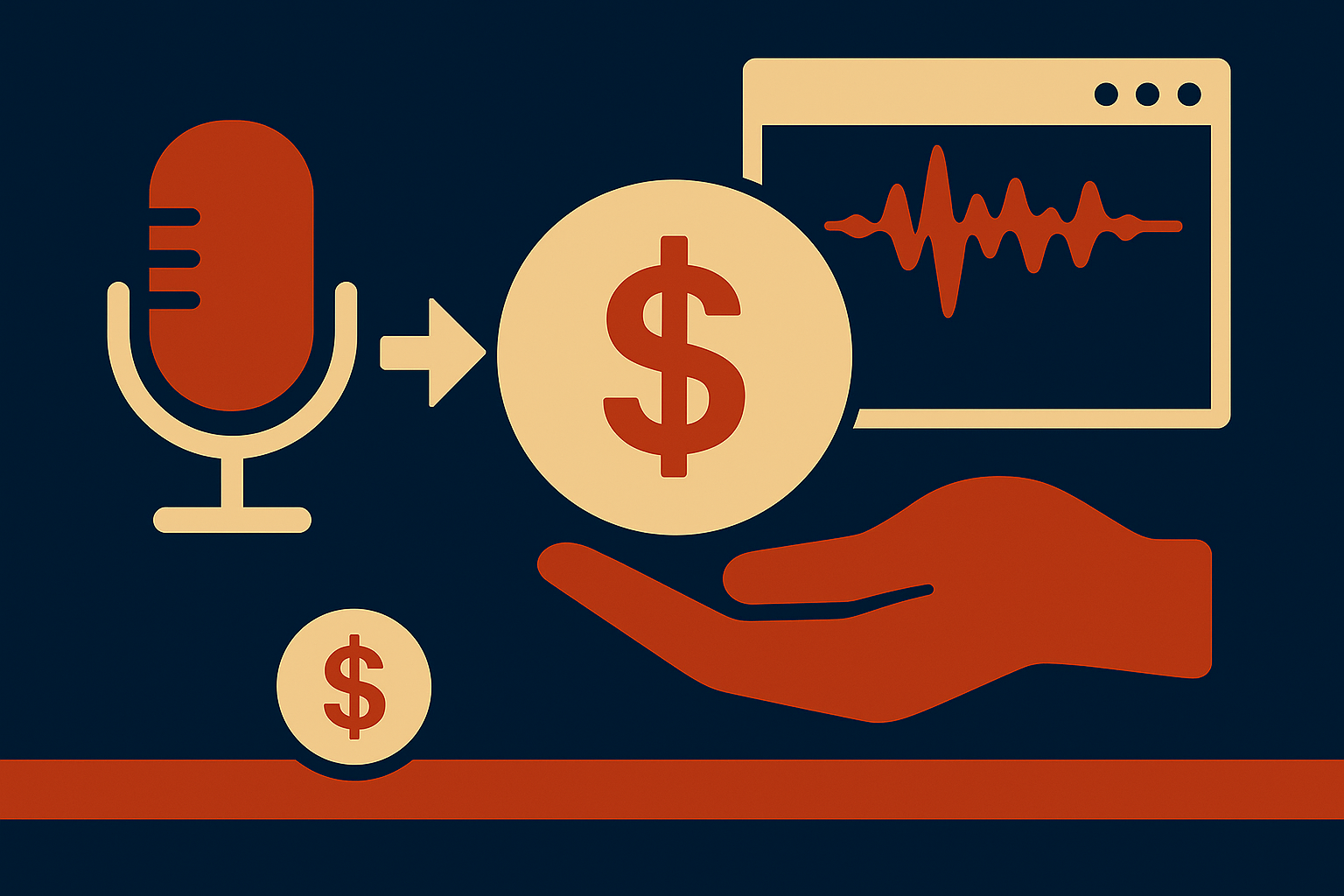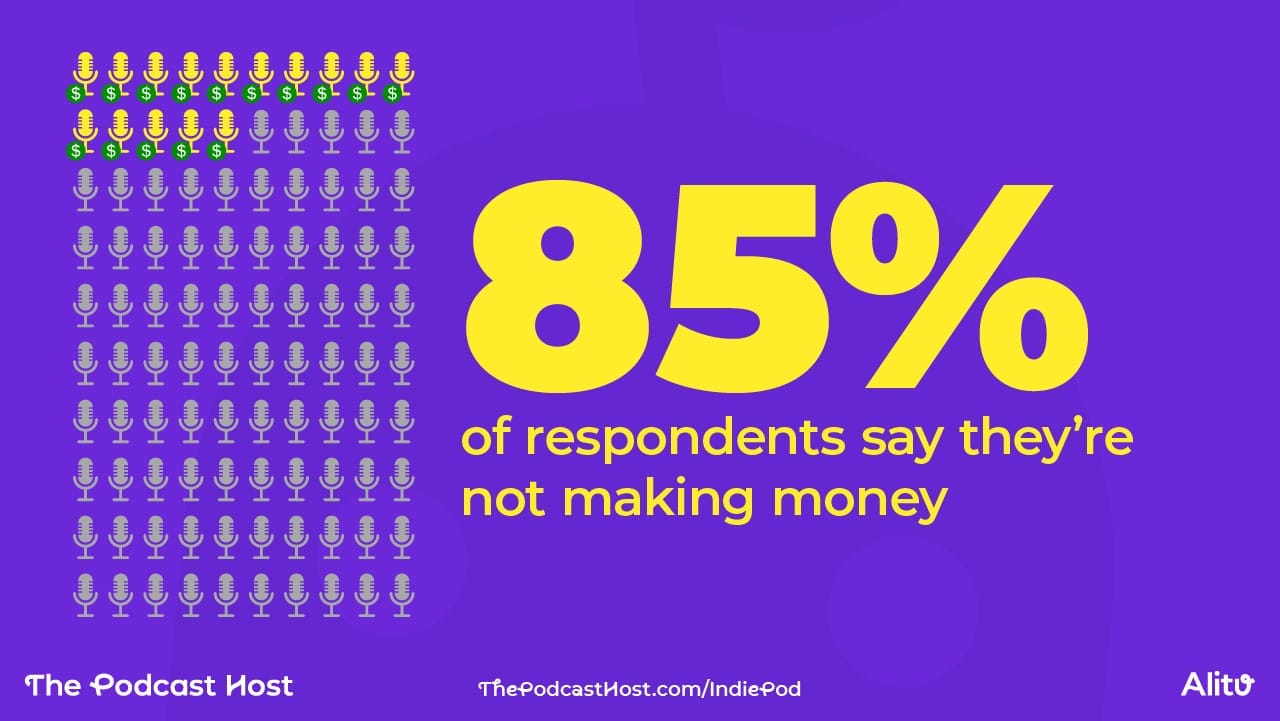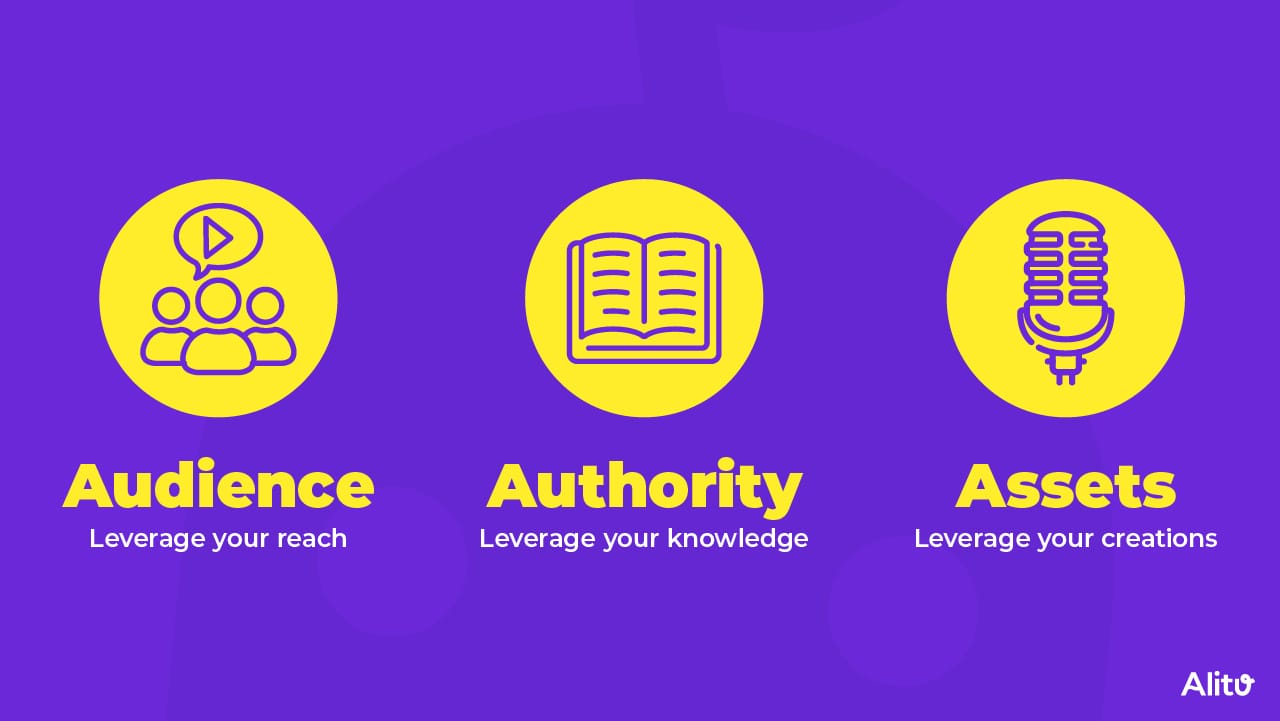Podcast Monetization Methods: 85% Make $0 - But You Can!
Small show or not, you can still make money podcasting by focusing on three pillars: Audience, Authority, and Assets.

One of the biggest headlines from our recent Independent Podcast Report was that only 15% of respondents reported making any money from their content.

To be fair, only 9% considered revenue and profitability their primary measure of success, but 39% did see making money as one of their biggest challenges.
So maybe money isn't the reason you got into podcasting, nor what drives you to keep going. But who wouldn't want to at least cover those monthly hosting bills and have a little left over for pizza?
Reaching that point gives you a foundation to build on, and from there, who knows where it could take you.
How to Make Money in Podcasting
In any financial strategy, diversification matters.
Or, to put it plainly, don’t put all your eggs in one basket.
The same applies to podcast monetization. No single method is likely to earn all the money you will ever need, and relying on just one can hold you back.
If you want to break even or turn a profit, you need a mix of approaches. The good news is that you can diversify your monetisation strategy by leaning into your podcast’s three strongest resources: your fans, your skills, and your perspective.

I’ll show you a three-part approach to monetize your podcast using your
- Audience
- Authority
- and Assets
Think of them as three industrious chickens, providing different kinds of eggs that you’ll distribute in separate baskets. As you’ll see, sustainable income comes from using multiple sources and distribution methods.
Audience: Leverage Your Listeners
The first chicken in your coop is your podcast’s audience. These people already trust and enjoy your content. To get more of it, they’ll support you and your show via these five methods.
Sponsorships & Ads
Sponsorships and ads work best when you know exactly who listens to your show. Once you understand your audience, you can choose sponsors who want to reach those people. Dynamic ad networks can fill space, but they rarely match your listeners as well as sponsors you choose yourself.
You don’t need large brands to start. Small businesses in your niche are often eager to reach the same people you attract. A local company in a region where your show is popular might cover your hosting costs in exchange for a simple mention. Makers and indie sellers are another good option, especially if their products tie directly to your topic.
Pros: These partnerships can grow over the long term and lead to recurring income for both parties. Who doesn’t love a win-win?
Cons: Arrangements like this can be low-paying, without large numbers or a hyper-specific niche. But, show several small businesses how advertising on your podcast is a bargain compared to other digital advertising, and you can nurture a beneficial partnership.
Premium & Exclusive Content
When your audience enjoys your podcast, they’ll want more. You can offer paid subscriptions through Apple Podcasts, Beamly, or Supporting Cast, or create a private RSS feed for your supporters. Exclusive content, such as behind-the-scenes interviews or bonus episodes, is a great reward.
If you can't make more episodes, offer early access. Another option is to put your podcast’s back catalogue on a paid feed and let your newest episodes reign on the public RSS feed before joining the older episodes.
Pros: You own the product and create it by doing what you already do.
Cons: Extra episodes can take time. Holding your older episodes back from new audiences may slow growth. And, frankly, not all listeners will pay for extra content.
Crowdfunding & Donations
Ask loyal fans to support you via platforms like Patreon, Ko-Fi, or Buy Me a Coffee. Crowdfunding platforms like these encourage people to join a membership and give monthly support to creators. Additionally, your fans can communicate with you and each other via comments or community chats, which strengthens their commitment to your podcast.
Pros: Builds community and rewards loyalty, while providing recurring income for your work.
Cons: Sustaining crowdfunding income depends heavily on goodwill. If your followers aren't happy, they may withdraw their support.
Email List
In our over-stimulated world, sometimes people need a reminder to listen to their favorite podcasts. A pleasant, informative email shows your appreciation while reminding them that you’ve published a new episode. Your email messages can include content that enhances your episode, such as recipes, pictures, maps, or video links.
And, of course, you can include paid sponsorship spots, affiliate links, or coupon codes. Not only can your episodes include ad reads, but those sponsored messages can work in your email, too.
Pros: Email marketing has proven to be a reliable, direct channel for audience engagement that supports all your other monetisation methods.
Cons: If your podcast workflow has too many tasks, adding email marketing may feel tiring. But some podcast hosting services offer a newsletter feature that lets you send a message to your audience every time you publish.
Merchandise
You can design and sell branded t-shirts, mugs, stickers, or other items via print-on-demand platforms. Not only is it fun, but the items themselves also spread the word about your podcast. At least ten years ago, I supported Judge John Hodgman by buying my husband a t-shirt with a joke from the show. He wears it, and people ask him about it to this day.
Pros: Designing podcast merchandise and setting up product sales need little to no subsequent maintenance. And again, merchandise promoting your show is great for brand visibility.
Cons: Don’t expect to make much profit per sale. Unless your design is in high demand or your audience is huge, merchandise sales are like getting paid a couple of bucks to have someone else promote your show.
Your audience is your first circle of support, and you may be surprised by how they can help you. Once, a fan saved me money by improving my podcast logo for a reasonable fee. Speaking of using skills for success, let’s look at the next way you can monetize your podcast: with your authority.
Authority: Leverage Your Knowledge & Expertise
The next chicken in your monetization coop is your authority on your podcast’s topic. Some podcasters start with deep expertise. Others use their show to learn in public. Both approaches work because listeners value an honest point of view. As your audience grows, so does your credibility. That credibility often opens doors for paid work, teaching, consulting, and other ways to earn from what you know.
Of course, you’re not just going to walk into a room, say, “I’m an authority!” and have cash rain down upon you from the heavens. Here are some of the ways you can use your knowledge, skills, and outlook to monetize your podcast.
One-to-One Coaching
What are you really good at doing? No matter the skill, there’s someone out there who would love to learn about it directly from you. Your podcast already teaches the audience in general, but private coaching makes your ideas specific to one person’s experience.
There are certifications for coaching, but you can offer private learning sessions based on your authority alone. For example, you can sell a private one-hour video conference appointment in which you listen to their concerns and offer strategies. Or, if you have a planned presentation explaining how to do something, you can adapt it for an audience of one. Not only does this help you make money from your podcast’s material, but you’ll also practice adapting your knowledge to a specific situation.
Pros: Private coaching builds deeper client relationships and can generate income, while helping you see your podcast’s topic in a new way.
Cons: Scheduling coaching sessions depends on your time and availability. It can take time away from podcasting, family, work, or other obligations, so prepare for this in advance.
Courses & Workshops
Courses and workshops let you turn your podcast content into structured teaching. They work best when your episodes already follow a clear outline, because those outlines convert naturally into lessons. Once you refine the material, you can record it for audio, video, or both and host it on any platform you trust.
Live workshops help you connect with your most engaged listeners. Their questions show you where they need clarity and often spark ideas for future episodes. Pre-recorded courses scale well because you create them once and keep selling them as long as the information stays relevant.
Pros
Education has lasting value. Live courses let you vary the number of sessions, the length, and the group size. Pre-recorded courses can continue earning long after they’re created, as long as people still benefit from them.
Cons
Courses take real time and creative effort. Building them can feel like producing a second podcast. Some topics also need periodic updates to stay accurate and useful.
Ultimately, courses help you make money using your skills and talents while strengthening your relationship with your audience. But what if your audience isn’t interested in learning how to do what you do?
Done-For-You Services
I’d love to learn how to make sushi rolls. But I’m busy writing about podcasting, so I’ll order sushi from the shop down the street. The price I pay for good sushi would balance out the convenience and the time saved. And, I know the sushi will be good because a professional makes it.
Similarly, your podcast can sell done-for-you services. An astrology podcaster can sell personal astrology charts, or a knitting podcaster can repair hand-knit heirlooms. Why wouldn't someone hire their favorite podcaster to provide a unique service?
For years, we offered a podcast production service based on that same idea. Our audience trusted us, so hiring us felt like the obvious next step.
Pros: With enough demand, you can expand these done-for-you services with a team. This can provide a steady income, turning your podcast monetization into a sustainable business.
Cons: Done-for-you services can pull you away from your podcast. If you started podcasting to create a service business, that’s good. If you got into podcasting for other reasons, make sure these services don’t distract from your workflow.
Monetise Your Podcast Skills
Your podcast already shows that you can plan, record, edit, and publish on a schedule. Those skills are in demand. Many podcasters either don’t enjoy the production process or simply don’t have time for it. Tasks like editing, guest coordination, scripting, and content planning are all services people will pay for. Some companies even hire podcast hosts outright, so your on-mic experience has value beyond your own show.
Pros
Your podcast is a living portfolio. Anyone considering hiring you can hear your work and judge your style immediately.
Cons
Client work can drain the time and energy you need for your own show. If you’re not careful, it can push your podcast to the sidelines.
If you choose to offer done-for-you services, be honest about what you want. Producing shows for others can be profitable, but if you started podcasting to share your own ideas, you need boundaries. Otherwise, the paid work can take over and leave you burnt out on your own project.
What about using your own ideas to monetize your podcast? Let’s look at how your unique voice and vision can produce income.
Assets: Leverage What You Create & Own
Your third and final chicken may be the toughest fowl in the flock. These options focus on turning your intellectual property into income. You don't want to sell your ideas or episodes outright: instead, you want to make and sell products based on your episodes.
Books and eBooks
This hearkens back to the courses and workshops we discussed earlier. You can rewrite your podcast episode scripts into chapters of a book or several ebooks. If you can't put in the time to craft a long document, try rewriting one or a few episodes into a shorter guide.
Publishing an e-book or guide can be as simple as creating a PDF. But the self-publishing industry offers myriad ways to turn your podcast into a book and sell it directly to your audience.
Multimodal learning means that when people learn a topic through multiple methods (e.g., audio, print, and visual demonstration), they gain a fuller understanding of it. Your book can serve as a companion to your existing podcast and serve people who don’t learn well via audio or video.
Pros: You’ve already assembled the ideas; now they can work double duty as a book. Like courses and workshops, your book can enhance your reputation, promote your podcast, and provide income.
Cons: The cost of producing and promoting self-published books will affect your profit margin.
Products
Your podcast can inspire products that scale far beyond your weekly episodes. These can be digital tools, physical items, or anything that helps your audience solve a problem you understand well.
Our own path is one example. We once offered podcast production as a service, which limited how many creators we could help. Building Alitu changed that. Instead of supporting a handful of clients, we built a tool that helps thousands of podcasters edit their shows every day.
Other creators do the same in different ways. Flloyd Kennedy, an actor and audio fiction producer, created the Being In Voice Warm Up App to help podcasters prepare their voices. Some creators build templates, spreadsheets, or other small digital tools that make production easier for their listeners. Others branch into physical products. A few podcasts have even developed card and board games that tie directly into their themes.
No matter the format, products let your ideas work for people even when you’re not involved. They turn your expertise into something your audience can use on their own.
Pros
You own the product, set the price, and decide how it evolves over time.
Cons
Building, promoting, and distributing a product takes sustained effort. You either handle that work yourself or hire help, which reduces your profit margin.
Affiliate Marketing
You can set up affiliate links from episode one. You'll only get paid when people buy through them, but they're a low-effort on-ramp and can act as useful placeholders for future sponsorship slots.
With that said, affiliate marketing works only when your recommendations are genuine. Listeners trust you because they hear from you regularly, so any product you endorse needs to be something you actually use or believe in.
Plenty of companies offer affiliate partnerships, but not all of them fit your show. I once received an offer to promote outdoor fireplaces on a creative writing podcast. I couldn’t test the product, it had no connection to my topic, and promoting it would have damaged the trust I had built.
Affiliate links and reads are easy to set up, but they only pay off when the match is right.
Pros
Affiliate programs are flexible, low-maintenance, and pair well with other monetisation methods.
Cons
You have limited control. Programs can end without warning, brands can change direction, and some agreements restrict you from mentioning competitors.
Choose affiliate deals only when you can recommend the brand honestly. Anything less will cost more than it earns.
Audience, Authority, Assets
You don't have to try all of these methods, but combining one from each category can strengthen your podcasting practice. Before you forget about our three chickens, Audience, Authority, and Assets, let me show you a success story that makes the most of them.
Jim Henson wasn't happy about character merchandising. But licensing Muppet characters and stories sustained Henson Associates’ projects from Sesame Street through Labyrinth.
Henson Associates’ monetization strategy used:
- Audience (kids who love the characters),
- Authority (Children’s Television Workshop’s commitment to education in conjunction with Henson’s honest, fun perspective),
- Assets (Henson Associates’ characters and perspective have filled books, record albums, video games, and theme parks)
This approach helped create a sustainable income. By diversifying his revenue, he protected what he prized most: his creativity and ability to make new work. The generation that grew up with the Muppets shares the fun with the next generation, and the cycle continues.
Maintaining more than one monetization strategy protects you by providing some income at different times. When you have three chickens, if one chicken isn't laying eggs, another probably is. And, none of them depend on only one buyer.
Monetization, like all aspects of podcasting, requires diligence, patience, and consistency. But when your audience, authority, and assets are healthy, you can make income that sustains your podcast and helps you to grow.
The Podcraft Academy can help you grow your show in a way that feels sustainable and true to you. With feedback and accountability, you stay focused and build a podcast that becomes easier to monetise over time. We’d love for you to join us.
